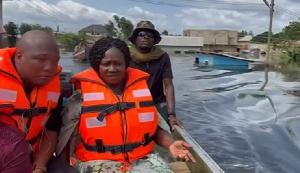The 2020 running mate of the National Democratic Congress (NDC), Professor Naana Jane Opoku-Agyemang has called for coordinated efforts by stakeholders in the fight to prevent societal issues and crises when they occur.
According to her, there should always be a proactive approach to prevent situations from occurring rather than addressing them after they occur.
The comments by the esteemed professor came when she toured some of the flood affected communities in the North Tongu Constituency to assess the devastating effect caused by the spillage exercise that is currently being undertaken by the Volta River Authority (VRA) at the Akosombo and the Kpong dams.
Speaking with GhanaWeb TV, Prof. Opoku-Agyemang questioned the steps taken by the VRA to announce the spillage.
She stressed that the VRA could have explored more options so the communities who are affected now understood the impact of the spillage before they began.
She acknowledged that while some issues may arise from natural occurrences that are beyond human control, intentional actions such as the dam spillage should be carefully evaluated and addressed to avoid unnecessary suffering.
“For me, I am very interested in preventing situations as much as you can. If for an example, it is force majeure as in a natural occurrence, you can understand. Nature can defy anything we humans are doing. But when it is intentional, you know when you are going to spill. You may say warned them but in what sense, who heard and in what way.
“What was the evaluation done and at what point did we know that if we don’t do this, we are going to suffer less and in what sense. Did the people really understand it and did they appreciate them? Were they supported to understand or it’s a matter of we’ve announced it so, if you hear it or not i have done my job. So, that attitude too will have to be reviewed so we can do things differently,” she questioned.
Prof. Opoku-Agyeman further stated that the conversation about the flood should be extended beyond immediate assistance and aid to getting long lasting solutions to address future occurrences.
“Because in the end, they are ordinary people like everybody. I may give that instruction and go home knowing very well that the water may never reach my home. But how about those who will suffer, what do we do?
“These are dispassionate conversations we must have. We cannot legislate everything and even legislate morality. You cannot bargain with sympathy, you cannot bargain with caring for people. So, we really need to speak other languages even as we solve problems. We should wait for the problems to arise before we solve them,” she added.
Source: ghanaweb.com




